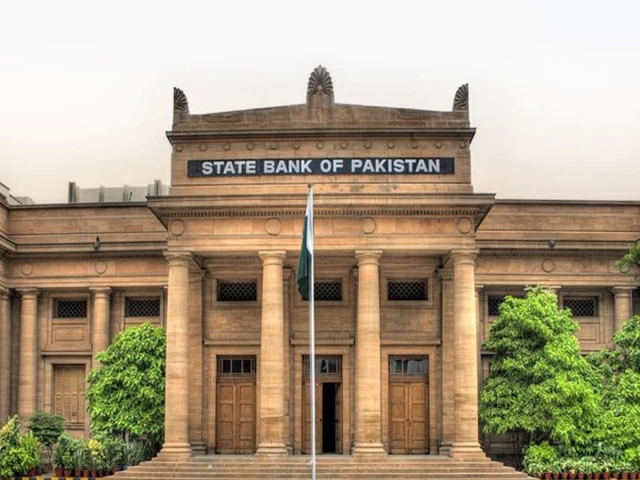SBP review shows 9.1b digital transactions mark record year amid trust, connectivity challenges
State Bank of Pakistan. Photo: File
KARACHI:
Pakistan’s digital payments landscape continues to expand at an impressive pace. Yet the State Bank of Pakistan’s (SBP) latest Annual Payment Systems Review (FY2024-25) warns that deep-seated structural, operational and regulatory challenges could slow the country’s transition to a fully digital economy.
The report shows retail payment transactions surged to 9.1 billion, valued at Rs612 trillion. This represents a 38% increase in volume and 12% in value compared to last year. Digital channels now account for nearly 88% of these transactions, a leap from 78% in FY2023.
While the payments infrastructure expanded significantly, distribution remains highly urban-centric. POS terminals grew 56% to 195,849 and QR-enabled merchants doubled to around 1.1 million. However, rural and semi-urban areas still rely heavily on over-the-counter (OTC) transactions at bank branches or branchless agents.
Despite visible progress in infrastructure rollout, Pakistan’s payment ecosystem continues to face uneven adoption across socioeconomic and geographic segments, the SBP report cautions. The country’s 731,814 branchless banking agents play a crucial role in financial outreach. Yet many regions remain underserved due to low digital literacy, patchy internet connectivity and inconsistent agent liquidity.
ATMs, now exceeding 20,000 nationwide, remain primarily cash-withdrawal points. Some 98% of their use involves dispensing rather than depositing funds. This continued reliance on cash underscores what the central bank describes as Pakistan’s “sticky cash culture”. Deep-seated consumer habits and trust deficits hinder migration to digital modes.
The review also points to regulatory bottlenecks and interoperability issues between banks, Electronic Money Institutions (EMIs) and fintech platforms. Although Raast has processed 1.9 billion transactions worth Rs44.3 trillion since inception, integrating newer players and ensuring consistent uptime remain ongoing challenges.
The launch of PRISM+, Pakistan’s upgraded Real-Time Gross Settlement (RTGS) platform adopting ISO 20022 standards, represents a major leap for large-value payments. Yet the transition also demands “sustained investment in compliance, cybersecurity and capacity building” across participating banks, according to the SBP. Smaller financial institutions, particularly microfinance banks, often struggle with the high cost of system upgrades and technical integration.
With digital transactions expanding exponentially, cyber risk has become a growing concern. Vulnerabilities exist around authentication, data privacy and fraud detection. As transaction volumes balloon, so do incidents of phishing and social engineering scams targeting customers of mobile banking and wallet platforms.
Industry insiders note that while the central bank’s cybersecurity guidelines are robust, implementation across smaller banks and fintechs remains inconsistent. The absence of a unified fraud reporting framework further limits sector-wide responses to digital payment threats.
Despite impressive growth in mobile and e-wallet usage, now totalling nearly 110 million users across platforms, financial inclusion remains shallow. A large share of these accounts are dormant or used only for government transfer programmes. The SBP acknowledges that while initiatives like Raast’s Person-to-Merchant (P2M) feature and the Digital Acceptance at Cattle Markets campaign have expanded visibility, “behavioural and trust barriers” continue to impede adoption.
Cash remains the dominant medium for daily transactions, particularly among small traders and informal workers. They cite high transaction fees, unreliable networks and lack of digital literacy as deterrents.
Pakistan’s fintech sector is evolving rapidly, supported by the launch of SBP’s Regulatory Sandbox in 2025. This allows startups to test new products under controlled conditions. Yet the central bank concedes that balancing innovation with consumer protection and systemic stability remains delicate.

